Well folks, it’s been a year of seeing films, and a year of writing about them.
I didn’t see everything, and of everything I saw, I didn’t write about everything.
But don’t let’s stop that from having a fun time with a post that’s so simple to write it makes me feel guilty.
Here are my favourite ten films of 2014. And my least favourite five.
The Top Ten
10 – The Lego Movie

Creative, witty and energetic. Brilliantly, comically animated. Adorned with fabulous visuals, including genuinely remarkable renderings of plastic. The Lego Movie, like their other 2014 hit 22 Jump Street, displays the characteristic sense of humour of its writer-directors, Phil Lord and Christopher Miller: slightly subversive, totally accessible and full of variety. They don’t make Judd Apatow movies, shooting tons of improvisation and picking the best gags. They write. They plan. They know what funny filmmaking means, and it includes staging, movement, well-timed cuts and so much more that too much cinematic comedy lacks. The Lego Movie, despite being the most obvious toy advert of a movie in history – even the Transformers toys have names and characters to base a story on – combines this with a good heart and no cynicism. It celebrates breaking down corporate structures and restrictions in favour of doing whatever you want, even if that means building a stupid double-decker couch.
Having said that, it is still a toy advert, and the weird contortions it pulls towards the end to convey the message (one that I’m sure Lord and Miller had encouragement, shall we say, to include) that creativity and corporate profit-lust can work together in harmony do ring hollow and leave a slightly uncomfortable aftertaste. And the idea that Lego allows you to express yourself, while intoxicating and likely to inspire nostalgia for one’s youth, doesn’t actually make much sense any more, with the proliferation of bespoke, branded Lego sets and pieces that only fit together in very specific ways and tell other people’s stories. But there is a spirit in The Lego Movie, neutered and bowdlerised though it is, that wants you to stop buying into this, and more importantly stop buying Lego! Discard the Lord of the Rings-licensed tools of oppression, comrades, and raid eBay for giant boxes of old Lego bits that can be made into a really very massive spaceship indeed! ¡Viva la revolución!
9 – Lucy
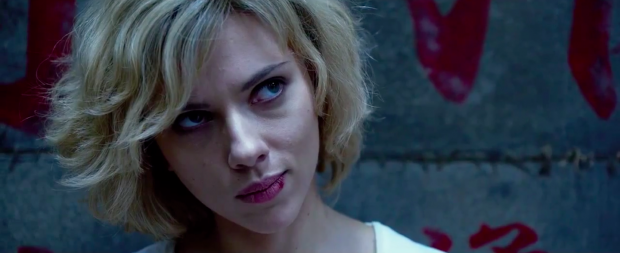
Let me clear this up. We DO use more than ten percent of our brains. It’s a captivating myth that we don’t, though, and every couple of years Hollywood remembers it and generates some popcorn fodder that is in equal parts incredibly stupid and irresistibly entertaining. Last time it was Limitless, this time it’s Lucy, in which Scarlett Johansson brings credibility and attitude to the slightly cartoony role of a woman who is gradually unlocking her other 90% and picking up superpowers along the way. It sounds dumb, and it is dumb, and it makes such close and eager reference to genuine biology alongside the nonsense that it made me angry, but it’s unpredictably expressive with its use of montage early on, movie-literate and satisfyingly bare-faced about the tropes it uses (Lucy can memorise a book just by flicking from cover to cover! Morgan Freeman is explaning stuff!), pleasingly light-hearted despite a few dark moments here and there and damn near intimidating in its rampage towards an absurd and brilliant conclusion.
My favourite thing about Lucy : Intertitles interrupt the film every once in a while, as things get madder and madder, displaying, in giant text, “20%”, “30%”, “40%”, and so on. Sounds gimmicky, but as the action ramps up, you really can’t wait to find out what happens at 100%…
8 – The Raid 2: Berandal

The Raid 2 is so imaginative. I didn’t expect to be blown away, given that I’d felt only lukewarm about 2011’s The Raid: Redemption. I believed that because that film had been praised for its inventive action, it was just something that I, not a seasoned action fan, was not going to really get. (Though perhaps I was just being churlish. I’m like that a lot when faced with hype and wild praise.)
How wrong I was. I do think The Raid 2 is more accessible than its predecessor, probably in part because it isn’t set entirely in a dark, cramped tower block, and its set-pieces are arguably more creative and exciting, but really we’re splitting hairs here. Both films are superb, grimy, technically brilliant martial arts movies made by a Welshman in Indonesia. The Raid 2 in particular isn’t scared to earn its 18 rating and without wishing to sound like the kind of person who is pathetically satisfied by such things, it’s encouraging, nay, uplifting, that if The Raid 2 wants to do something a little bit horrible, it does something a little bit horrible.
And the car chase fight sequence arguably outdoes The Matrix Reloaded‘s, and I LIKE THE MATRIX RELOADED, OKAY?
7 – ’71
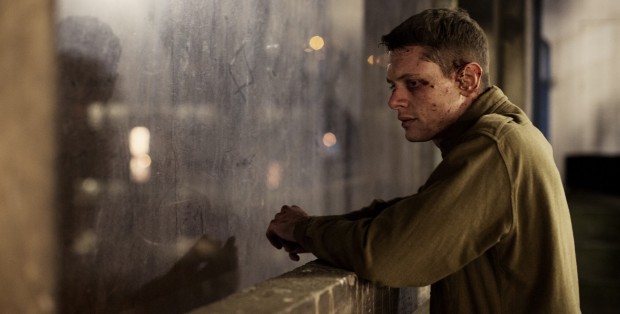
The Troubles, the Northern Irish political conflict of the latter half of the 20th century, were before my time. But I know that they’re to be respected, particularly growing up near and living in Birmingham, a major target of IRA bombing, and hearing stories about them. So it worried me that a behind-enemy-lines, one-man survival thriller was to be set in Northern Ireland in 1971. I like these kinds of films but I’ll be the first to admit they’re often histrionic and unconvincing. (Alright, not admit, assert. It’s why I like them.) I didn’t want ’71 to overly enjoy the violence of its setting and simplify everything else.
And it doesn’t. It’s a scary film that starts off in a downright terrifying situation. When a group of young British soldiers are pelted with bricks and bottles during a raid on a house in Belfast, there’s no joy in the action, and it’s well handled. While the cinematic style is painted in British-action-movie “gritty”, usually a banal aesthetic that’s trying to sell realism but is actually just as stylised as any action movie (only in a different way that it refuses to admit and nobody appears to have noticed), it strongly evokes the kind of news footage of riots with which we’re all familiar, so it offers something interesting visually. Politically, ’71 exhibits a delicate touch here: you fear for the soldiers without hating the mob attacking them. (Though I expect that those with a stronger relationship to The Troubles would see different things in it.)
From there, the film becomes a thriller about one soldier lost alone in the streets of Belfast, hunted by men who want him dead, steadily bringing in more elements of its genre, and its setting informs its action without becoming heavy-handed. It climaxes with a malleable, shifting battle in the Divis Flats that’s a fitting release of the film’s gradually increasing tension. And Jack O’Connell is a true star. Unbroken is announcing him to Hollywood, and he’s arguably better in it (being given more to do helps), but ’71 is the better film, the culmination of the rich career he’s already had in Britain, and the one that ensures that over here his will be a name we’ll continue to see for a long time to come.
6 – Edge of Tomorrow

Read my full review of Edge of Tomorrow here.
I strongly believe that Tom Cruise was genetically engineered to be a star. He’s a much better actor than he’s usually given credit for, he can flash a world-class smile, no matter how much you want to hate him he’s unwaveringly, professionally friendly, and he has just enough weirdness about him that you’re never bored of him. Edge of Tomorrow understands Cruise the PR Machine… and puts him in a war with aliens. No wonder he looks worried.
He’s also the kind of star who’s easy to ignore for several films and still have on your radar. And that means people will miss his movies. And that makes Edge of Tomorrow the kind of film that’s an unapologetic joy to introduce people to. It’s easy to have ignored and forgotten all about it, but encourage someone enough to watch it and they’ll thank you. It won’t be anybody’s favourite sci-fi movie of all time, but it’ll be one of their most fondly remembered. It’s not interested in selling you how cool it is. It’s just content to get on with the job of being cool. And that’s cool.
5 – Interstellar

I adore Christopher Nolan’s sincerity. It’s the secret behind his work. He asks you to believe in dream sharing and follow some deeply complex plots, and what keeps you there is that he means it. He wants to do right by his audience, and he wants to show us things that nobody else can. He won’t even let the trailers to his films reveal as much as trailers typically do. He knows that surprise is massive and won’t ruin our experiences. (Even so, I still try to avoid trailers to his films. After all, I know I’ll be going to see a Christopher Nolan film. I don’t need it sold to me any more than that.)
Interstellar is perhaps the most blatant Nolan has ever been about his sincerity, and its earnestness keeps it just on the right side of a very precarious knife-edge between genuinely moving and profoundly silly. He takes us through a wormhole to a planet orbiting a black hole – along the way composing the most awe-inspiring images of space you’re likely to have ever seen in science-fiction, as well as showing the science a lot of respect – and into a four-dimensional space in which all bets are off and everything could fall apart, but just as he has his characters sincerely insist to one another that love can transcend space and time and bind people together, so his sincere insistence that his characters sincerely insist to one another that love can transcend space and time and bind people together transcends cynicism and misanthropy and binds the film together. Interstellar ultimately yells at you that love is powerful and beautiful, and Nolan’s sincerity drives the entire journey.
When Interstellar is being sci-fi, it works. When it aims higher, it really, really works. If you haven’t yet seen it, I’m sorry that you missed it on the biggest screen you could find. But the film’s most breathtaking scene would work on a screen of any size. It’s built around a close up of a man looking at his children. And it’s the most overwhelming, staggering moment in a film crowded with phenomenal, awe-inspiring spectacle and majesty. Because it’s sincere.
4 – Gone Girl

Read my full review of Gone Girl here.
I find it impossible to mention David Fincher without the word “consummate”. The man makes consummate movies. Every time I see one of his films, I wonder why all films aren’t like his. They’re precise. Composed. Assured. Gone Girl is no exception, and despite a niggle here and there – and what Fincher film can’t you say that about? Ah yes, Seven – it’s an engrossing mystery, the most incisive and blackly comic media satire since Natural Born Killers, a perceptive and uncomfortable fable about relationships and gender, and simply a good old-fashioned ripping yarn.
Granted, one or two of those niggles are really rather more than niggles, but Gone Girl never feels as though it’s doing or saying anything simply to go against the grain and whip up controversy (although you’d only have to be slightly worse disposed to it than I am to think it is). The world it depicts is worth taking seriously. In Gone Girl, gender is foregrounded, carrying expectations, roles, and power, and the film’s study of what men and women seem to be and do, and what they actually are and do, is absolutely of its time. It’s not quite a reaction to feminism and the changes it has caused in society, but it’s certainly a response to it, and it’s disrespectfully simple to write it off as a men’s rights activist’s fantasy, as a good portion of the Internet has done. Gone Girl rewards your time and engagement. And a niggling feeling tells me it may grow in stature in years to come.
3 – The Wolf of Wall Street

Read my full review of The Wolf of Wall Street here.
The Wolf of Wall Street is spontaneous. It feels structureless at times. It has whims. If it feels like putting a lit candle in Leonardo DiCaprio’s anus, it will. If it feels like making audible the inner monologues of negotiating businessmen, it will. If it feels like embarking on a ten-minute drug-addled set-piece involving a set of steps, it will. It’s what keeps its three-hour duration from dragging: you’re never sure of where you are and what’s coming next. It’s thrilling, cinematically unconstrained, and full of life.
It’s also deeply confrontational. It demands that we ask questions of our own reactions to it, forcing us to consider the part we play in the culture of cheating, crime and excess that it depicts. It’s easy to criticise the results of capitalism getting everything it wants. It’s harder to appreciate why the problem isn’t a simple one, and why you’re not separate from it. It’s a film I continue to struggle with and will perhaps never come to a conclusion about. But it makes me think more than almost any other of the last year, and it grips me from start to finish.
2 – Boyhood
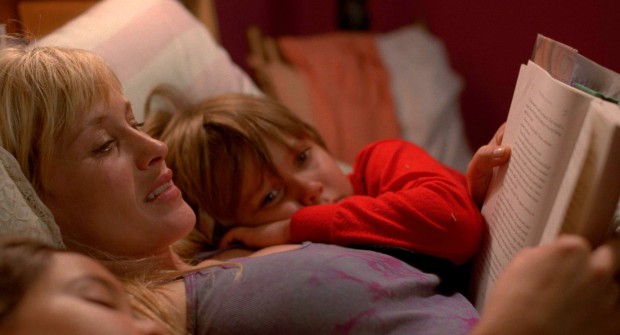
Read my full review of Boyhood here.
Miraculous. There is no finer way to describe Boyhood. It’s a miracle that it ever got made, with the people with the money needing to trust that they’d see a return after twelve years of shooting and nobody involved in the project losing interest or faith. And it’s a miraculous achievement, a loose-knit story of one family’s life that transcends itself, becoming more than the sum of its parts. It’s about the present. The impossibility of predicting where you’ll be next year. The haziness of memory. The way in which life is a constant improvisation. How you trust your parents, believe they know how life works, not realising that they’re feeling their way through and hoping for the best as much as you are. It’s calm, and open, and eager, and honest. Its gimmick is no gimmick at all, it’s key to the film’s message. Our characters are no more fully-formed at the end than they were at the beginning. They were complete people then, and they’re complete people now. They were fully-formed at every point in between.
Boyhood shows us that life is about neither destinations nor journeys. There’s only right now.
1 – 12 Years a Slave
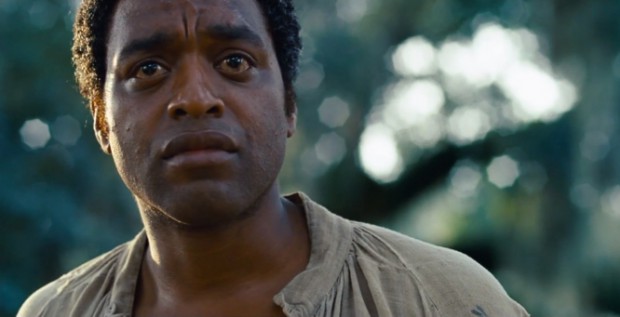
Read my full review of 12 Years a Slave here.
12 Years a Slave is a true masterpiece. It stares at the world in which slavery was tolerated, practised, thought to be just, with unwavering resolve and honesty. It does not manipulate. It does not deceive. It is horrific, justifiably so, and never artificially exaggerated. It doesn’t need to be, and moreover it would weaken its impact and message if it were. 12 Years a Slave has a point of view, and it’s not interested in balance, so it might be tempting to look for chicanery in it. But all it needs to do is keep a steady gaze at the true horror of American slavery, because it’s not something we, as a culture, truly understand. Indeed, we never really will, so far removed are we from it, but 12 Years a Slave makes real like nothing else the frighteningly quotidian manner in which it operated and the abhorrent nature of a society that proclaims but does not believe that all men are created equal.
Slavery wasn’t special. It wasn’t unusual. It was the way America worked. 12 Years a Slave taught me that.
The Bottom Five
5 – Under the Skin

Read my full review of Under the Skin here.
Technically interesting, artfully constructed, and obscure beyond tolerance. It’s so frustrating to feel that a film is deliberately keeping itself closed to you, because there’s so much potential in Under the Skin. But it didn’t seem to like me. So I don’t like it.
4 – Frank
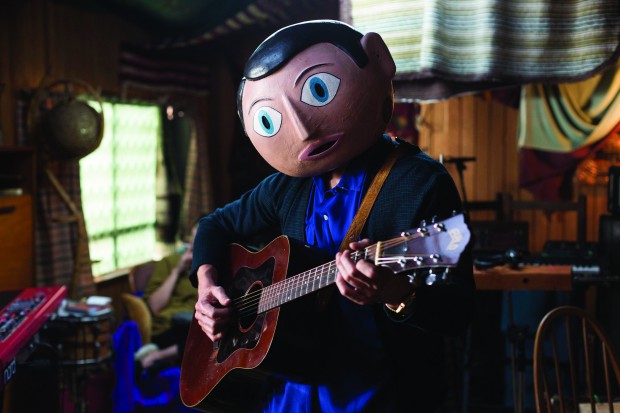
Simply dull. Its charm doesn’t take it very far, and its subtext about mental illness doesn’t get it much further. But the big head looks funny, I suppose.
3 – Blue Ruin

An engrossing opening twenty minutes lead into a pointless and tedious remaining seventy in this ultimately uninspired and plain vigilante revenge story. When the credits revealed that it had been funded through Kickstarter I somehow wasn’t surprised. The best thing about Blue Ruin is that the protagonist looks enough like Peter Hitchens that you can pretend it’s a cautionary satire about capital punishment and have-a-go heroes.
2 – X-Men: Days of Future Past

A $200 million film that feels as though it was made on a shoestring. Sets that feel empty. Scenes that feel lifeless. Action that feels sparse. And this is despite things like a baseball stadium being levitated through the sky. I don’t know how such emptiness was achieved, but it obviously cost them a lost of money to achieve it. Add to this a plot that actively shows contempt for its audience: We begin in a fight in the future between the X-Men and some robots. The X-Men are losing. This conflict hasn’t been set up ever before, it’s brand new for Days of Future Past. Wolverine is sent back in time to make Magneto and Professor X make friends, so that this horrible future can be averted. He manages it. So what you’ve got is a film that invents a meaningless scenario, the successful resolution of which means that the events in the film never happened. It’s the cinematic equivalent of makework. It doesn’t need to exist.
(I appreciate the absurdity of complaining that the events of a film about mutants travelling through time never happened, but this film shows its audience no respect. It deliberately wastes your time.)
It’s worth seeking out the opening fight with the portals and the genuinely funny and well-conceived Quicksilver scene. But that’s all Days of Future Past has to offer. I don’t know why I’m not just done with comic book movies.
1 – The Inbetweeners 2

Read my full review of The Inbetweeners 2 here.
The depressingly ugly latest instalment of what began as a very well-observed, witty and surprising television programme. Where there used to be innocence, now there’s aggression. Where I used to enjoy the company of these four kids, now I don’t want to be anywhere near them. The Inbetweeners didn’t need to change like this and I don’t know why it has, and given the nature of sitcoms there’s nothing to prevent the selfish and vaguely threatening characters all springing back and becoming good-natured and stupid again. But if the trend continues I shudder to think what a further sequel would be like.